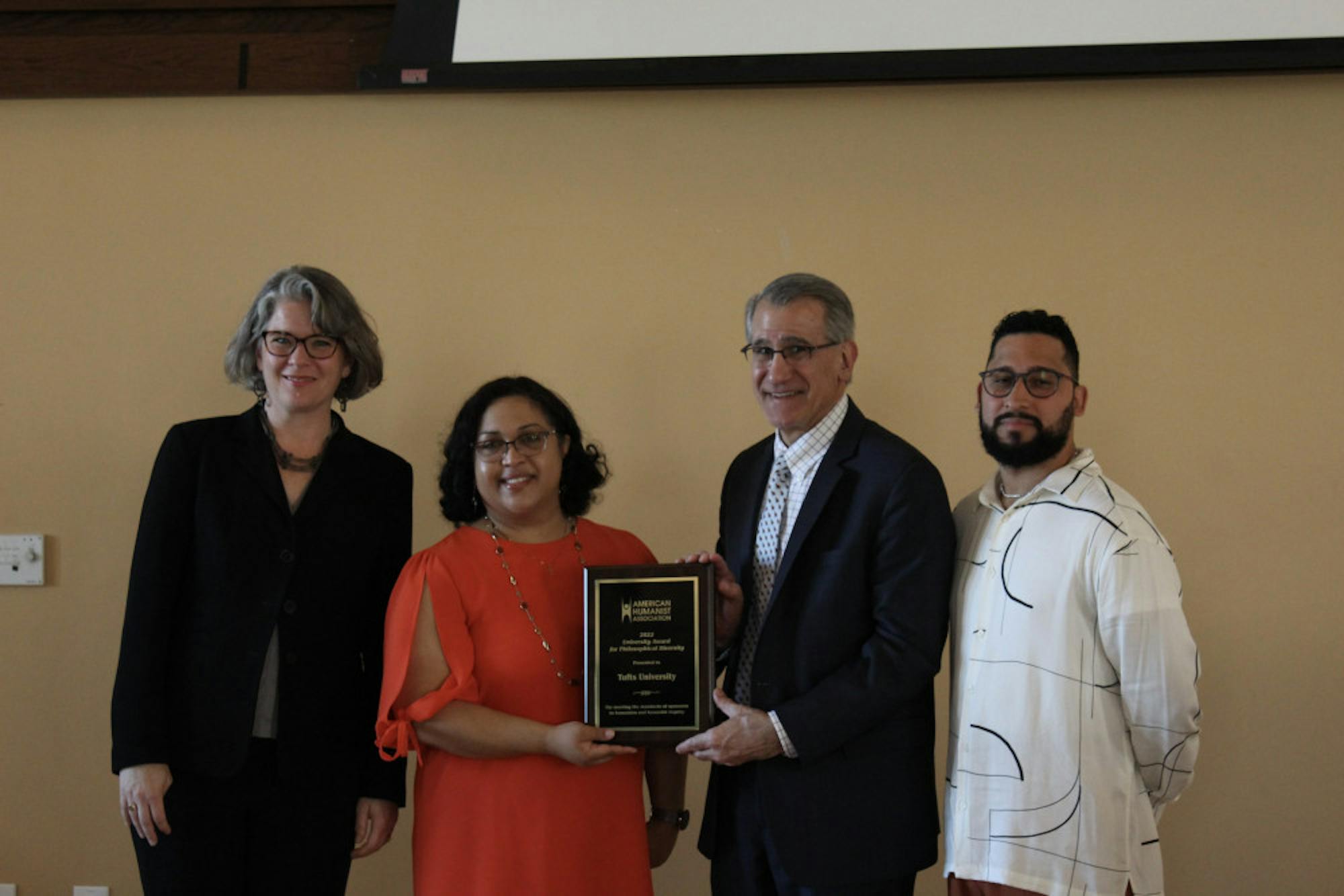On Nov. 2, Tufts was presented the University Award for Philosophical Diversity from the American Humanist Association. Nadya Dutchin, executive director of the AHA, came to Tufts to deliver the plaque and remarks on the purpose of the AHA, how it connects to humanism and why Tufts was the chosen recipient.
“The AHA is so incredibly proud to award … the University Award for Philosophical Diversity to Tufts University for having a vision to support students — all students — but particularly secular students who have been an afterthought in many cases in our school,” Dutchin said at the acceptance ceremony. “We are so proud to be partners with you and to lift up the work that you are doing.”
The American Humanist Association is a long-standing national organization with over 200 local groups dedicated to spreading the voice of humanism, a nontheistic philosophy centered around the value of human life and capability.
“The AHA is an organization that was created to link people together in a community, particularly atheists and agnostics and freethinkers, so that we can explore the fullness of what it means to be truly human,” Dutchin said.
Explaining the reasoning behind granting Tufts this award, Dutchin emphasized how secular students at other colleges are often missing a community to serve as a sense of home.
“We long for home, we long for connectivity, love and in some cases belonging,” Dutchin said. “But also, more importantly, the feeling of home. There’s nothing like that. And some people don’t have a home to connect to and so there’s a longing for the idea of a home. … [Religious chaplaincies] bring in a familiar sense of support, a touchstone to something that’s familiar, that may feel like home… So where does that leave our students who are not connected to any religious faith whatsoever? It doesn’t leave them anywhere.”
Tufts established a Humanist Chaplaincy in 2014, in an effort to “attend to the many changing needs of students across the nonreligious spectrum,” according to its website. Anthony Cruz Pantojas, the Humanist Chaplain at Tufts, explained the purpose and importance of the chaplaincy at the award ceremony.
“The humanist chaplaincy serves as the homeplace for our students to discover, explore, interrogate and live their lives in exciting and capacious ways during their time at Tufts,” Cruz Pantojas said. “As one of the few humanist communities of practice in higher education, we aspire to co-create a future of radical interdependence, liberation and meaningful accountability.”
Rev. Elyse Nelson Winger, the university chaplain at Tufts, noted that receiving the award from the AHA will serve to benefit the Tufts humanist community.
“This award provides an opportunity to reflect on the years of leadership and vision among students that led to the creation of the Humanist Chaplaincy in 2014,” Winger wrote in an email to the Daily. “[It] is a wonderful affirmation of the University's, the Chaplaincy's, and most importantly, students' work at community-building, community service, and intellectual and reflective engagement within diverse secular contexts.”
Cruz Pantojas also recognized how this award might serve as a foundation for future collaborations between the AHA and Tufts’ humanist community.
“As institutions striving toward social change, there is potential to leverage our collective synergies and capacities to contribute to the pressing challenges we face,” Cruz Pantojas wrote in an email to the Daily. “I look forward to exploring generative collaborations with the AHA that help broaden our knowledge base around ethics, meaning-making, and responsibility in an evolving social and political climate.”
Cruz Pantojas also shared a quote from junior Jo Chung, a board member of the Humanist Community at Tufts, describing the type of service and learning students engage in.
“‘Even though HCAT is a fairly small group, we acknowledge that we are embedded within a network of relationships with the community around us,’” Cruz Pantojas wrote, quoting Chung. “We recognize that food insecurity is a reality for many, and this semester we are volunteering for Building Audacity to pack meals for families around the Boston area. In the past, we have also participated in environmental clean-up efforts like cleaning up the Fells and the Mystic River.”
For students interested in getting involved with humanism at Tufts, Cruz Pantojas said all are welcome to attend meetings or reach out to the chaplaincy.
“Students can connect with the Humanist Chaplaincy and our weekly HCAT meetings,” they wrote.






